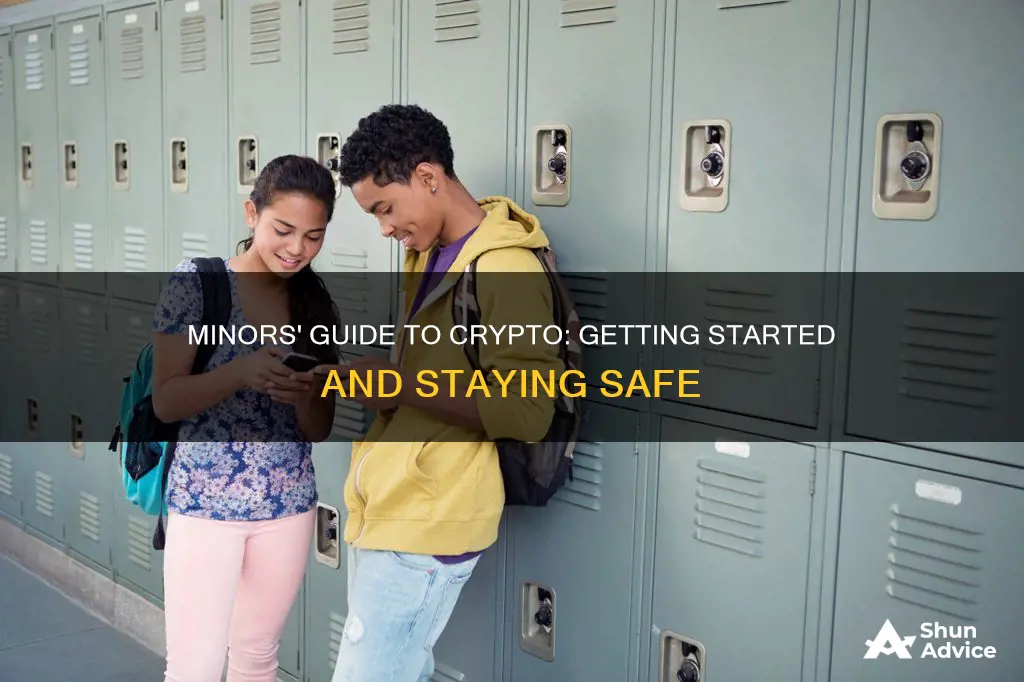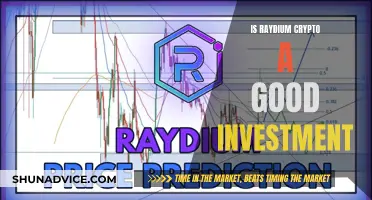
Investing in cryptocurrencies as a minor can be a challenging task due to age restrictions and the inherent risks of the asset class. However, with the right approach and guidance, it is possible for minors to enter the world of crypto investing. The first step is understanding the legal landscape, as there is no universal law prohibiting minors from investing in cryptocurrencies. Instead, the restrictions are platform-specific, with some exchanges imposing age limits and ID requirements. To circumvent these obstacles, minors can explore alternative platforms that do not enforce such stringent measures, such as Bybit, MEXC, Weex, KuCoin, and Bisq. It is also essential for minors to involve their parents or guardians, not only for legal and practical reasons but also to foster financial literacy and awareness.
The next step is understanding the inherent risks and volatility of cryptocurrencies. Minors should be aware that crypto investing is not a get-rich-quick scheme and that the values of coins like Bitcoin can fluctuate dramatically. It is crucial to practice risk management and only invest what one can afford to lose. Additionally, minors should consider diversifying their portfolios beyond cryptocurrencies and into more traditional assets, such as stocks, bonds, or real estate. By starting small and adopting a long-term investment horizon, minors can gain exposure to the crypto market while mitigating the potential drawbacks.
Lastly, minors should be vigilant about scams and fraudulent activities prevalent in the crypto space. The decentralised and anonymous nature of cryptocurrencies makes it attractive to bad actors, so it is essential to conduct thorough research and only transact on trusted platforms. By following these guidelines, minors can navigate the complexities of crypto investing and take their first steps towards financial empowerment.
| Characteristics | Values |
|---|---|
| Age restrictions | Many popular crypto exchanges have age restrictions and do not allow users under 18 to sign up and trade cryptocurrencies. |
| ID verification | Crypto exchanges such as Bybit, MEXC, Weex, KuCoin, Margex, PrimeXBT, and Bisq do not require ID verification. |
| Legal considerations | In most countries, there is no specific law making it illegal for minors to buy crypto. |
| Advice for minors | Speak to your parents or guardian about any investments you make. Do your own research, and never invest more than you can afford to lose. |
| Crypto wallets | Store your investment in an offline cold storage cryptocurrency wallet. |
| Apps | The Binance exchange mobile app is recommended for minors as it has in-built features that allow you to purchase Bitcoin and Altcoins easily. |
| Bitcoin ATMs | Minors can use Bitcoin ATMs to buy and sell small amounts of Bitcoin without verifying their identity. |
| Freelance work | Minors can offer freelance services in exchange for crypto payments. |
| Gift cards | Minors can buy gift cards and then exchange them for Bitcoin on platforms such as Paxful. |
What You'll Learn

Crypto exchanges with no age restrictions
While there are no laws prohibiting minors from investing in cryptocurrencies, many popular crypto exchanges have age restrictions and require ID verification, making it difficult for minors to directly buy or trade cryptocurrencies. However, there are alternative exchanges that do not have such restrictions in place. It is important to note that investing in cryptocurrencies is risky due to the volatile nature of the market.
Bybit
Bybit is a global crypto exchange with over 10 million users and daily trading volumes exceeding $10 billion. It offers a simple process for purchasing crypto, supporting various payment methods such as credit/debit cards, bank transfers, Google Pay, and Apple Pay. Bybit does not require ID verification, but it is inaccessible in the United States due to IP address restrictions. However, users from the US can access the platform by using a VPN. Bybit offers competitive trading fees, with spot trading costs as low as 0.1%.
Kine
Kine is a unique crypto exchange that offers both decentralized (DEX) and centralized exchange (CEX) capabilities. Minors can create an anonymous account on Kine by choosing the DEX option during sign-up. Kine allows users to purchase USDT and earn interest through staking or farming. The platform offers low trading fees of 0.05% and does not require a VPN for anonymous trading. While Kine currently only supports derivatives trading, it has indicated that spot trading will be introduced in the future.
KuCoin
KuCoin is one of the world's largest cryptocurrency platforms, offering an extensive selection of over 700 coins for trading. It simplifies the process of purchasing crypto with fiat currency, providing multiple payment options, including credit cards, debit cards, prepaid cards, Apple Pay, and local alternatives. KuCoin's trading fees are set at a competitive 0.1%, and users can enjoy a 20% discount on fees by paying with the platform's native token (KCS). Additionally, KuCoin integrates free trading bots directly into the exchange, making it an attractive choice for individuals looking to capitalize on market volatility.
Margex
Margex is a user-friendly platform that allows individuals to acquire cryptocurrencies using their credit or debit cards without the need for identification. Margex stands out for its excellent security measures, employing cold storage and an innovative system called MP Shield to protect user assets and maintain market integrity. While Margex offers a selection of 39 coins, including major cryptocurrencies like BTC, ETH, SOL, and LTC, individuals seeking a broader range of coins may need to explore other platforms.
Weex
Weex is a crypto exchange that does not require identity verification, allowing minors to trade anonymously. Weex specializes in fee-free spot trading and futures trading, with low fees for makers and takers. The platform has high liquidity and minimal slippage, ensuring that orders are filled efficiently. Weex holds several regulatory licenses worldwide and has a user protection fund with 1,000 BTC in reserve in the event of a security breach. However, it is important to note that Weex does not support the direct purchase of crypto with fiat currency.
Bisq
Bisq is a decentralized Bitcoin exchange that allows users to buy and trade Bitcoin anonymously without providing any personal information. It utilizes Tor for enhanced security and does not store crypto or fiat funds on its servers. Bisq offers over 15 payment methods and supports more than 125 cryptocurrencies. However, it is important to note that Bisq is not suitable for beginners due to its complex nature as a decentralized platform.
Dogecoin Investment: A Good Bet or Not?
You may want to see also

Crypto exchanges with no ID verification
While many top-tier exchanges require ID verification, there are several cryptocurrency exchanges that do not require Know Your Customer (KYC) verification. Here are some options for crypto exchanges with no ID verification:
Poloniex: One of the older exchanges, founded in 2014, Poloniex offers features such as spot trading, staking, and futures. It is accessible via web and mobile platforms. Users can withdraw up to $10,000 per day, and this limit is increased to $50,000 with two-factor authentication (2FA). Poloniex also has an integrated NFT marketplace with zero initial transaction fees.
Binance: With millions of users, Binance is often the top exchange in the world in terms of trading volume. To trade on the exchange, all you need is an email address. With basic sign-up, you can withdraw up to 2 BTC worth of cryptocurrencies daily. However, please note that Americans will need identity verification starting mid-September.
StormGain: A newer exchange that launched this year, StormGain only requires an email to sign up. It supports Bitcoin (BTC), Bitcoin Cash (BCH), Ethereum (ETH), Ripple (XRP), and Litecoin (LTC). It stands out for its multiplier trading, offering a 100x multiplier.
KuCoin: Often compared to Binance, KuCoin offers a large selection of altcoins and has no KYC/AML requirement. It has low trading fees, and it is expected that many American traders will migrate to KuCoin after the upcoming American ban on Binance.
Bitfinex: Although Bitfinex has lost some popularity since last year, it is still a massively popular exchange that does not require KYC. Users can withdraw up to 10 BTC in a 24-hour period. However, Americans are currently geo-blocked from using the exchange.
BitMax: BitMax is another newer exchange that does not require KYC. While a few countries are geo-blocked, it has a 2 BTC withdrawal limit per day without KYC. BitMax supports a wide range of altcoins but is known for wash trading, so be sure to store your cryptocurrencies in a wallet.
Crypton: Founded in 2013, Crypton is a privacy-focused exchange based on the Utopia P2P system. Registration is completely anonymous, and it offers low commissions, six available cryptocurrencies, and a digital offshore feature. Monero (XMR), a privacy coin, is available on Crypton.
It is important to note that while these exchanges may be useful for trading, it is generally recommended not to keep your cryptocurrencies on them for extended periods. Additionally, always research the safety and security measures provided by each exchange before making any transactions.
Explore the Potential: Is 100X Coin Worth Your Investment?
You may want to see also

Crypto wallets
There are two main types of crypto wallets: hot wallets and cold wallets. The main difference is that hot wallets are always connected to the internet, while cold wallets are kept offline.
Hot Wallets
Hot wallets are digital tools that are always connected to the internet. Users can access these software solutions from a phone or desktop computer to monitor and trade their currencies. Hot wallets are highly convenient and can be accessed from anywhere with an internet connection. However, they are less secure than cold wallets and are vulnerable to a wider variety of attacks. Examples of hot wallets include:
- Online wallets: Keys are stored in an app or other software. Look for one that is protected by two-step encryption.
- Paper wallets: Keys are written on a physical medium like paper and stored in a safe place. This makes using your crypto harder because it can only be used on the internet.
Cold Wallets
Cold wallets store your digital keys offline, either on a piece of hardware or a sheet of paper. Hardware wallets usually come in the form of a USB drive that lets you buy, sell, and trade crypto while connected to a computer. Cold wallets are deliberately designed to be hard to hack. They are more secure than hot wallets but are nearly impossible to recover if you lose your digital keys. Examples of cold wallets include:
- Hardware wallets: Keys are stored in a thumb drive that is kept in a safe place and only connected to a computer when you want to use your crypto.
- Paper wallets: Your keys may be accessible via print-out QR codes, written on a piece of paper, or engraved on some other material, such as metal.
When choosing a crypto wallet, consider your trading frequency, the types of crypto you want to trade, your budget, and the functionality you need. Evaluate the wallet's security features, supported currencies, accessibility, customer support, and hardware wallet compatibility.
Investing in Multiple Cryptocurrencies: How Many is Too Many?
You may want to see also

Crypto ATMs
There are two types of Crypto ATMs: one-way and two-way. Most crypto ATMs only offer one-way transactions, meaning that crypto can be purchased but not sold. Some crypto ATMs offer two-way transactions, allowing users to buy and sell crypto in exchange for cash.
To use a crypto ATM, you will need a mobile phone, a phone number, a photo ID (sometimes), and access to a digital wallet. First, you will need to sign up for a digital wallet. Then, find a crypto ATM near you using a service like Coin ATM Radar or a simple Google search. Verify your identity by providing your phone number and, if required, scanning your photo ID or entering your Social Security number. Next, scan your wallet address by using the QR code displayed on your digital wallet. Select the crypto you wish to purchase, choose how much to pay, and complete the transaction by depositing cash or paying with another accepted payment method.
It is important to note that crypto ATMs charge high fees, with some charging more than 10% per transaction. There may also be minimum and maximum transaction limits set by the ATM company, typically ranging from $10 to $10,000. Additionally, crypto ATMs are limited in their number and locations, and users may need to travel long distances to access them.
Gold Coin Investment: Best Buys for Your Money
You may want to see also

Freelancing for crypto
As a minor, one way to invest in crypto is to freelance for crypto. Freelancing for crypto involves completing tasks or providing services in exchange for cryptocurrency as payment. This can be a great way to earn and invest in crypto while also developing valuable skills.
There are several platforms that connect freelancers with clients offering crypto jobs, such as LaborX, CryptoTask, and Upwork. These platforms offer a range of jobs, including:
- Software development
- Blockchain development
- Graphic design
- Marketing
- Content writing
- Data science
- Analytics
- Engineering
- Architecture
To get started, you can create a profile on one or more of these platforms, specifying your skills and services. You can then browse and apply for jobs, send messages with your offers, and bid for projects. Once you've completed a job, don't forget to leave a review to help build your reputation and credibility.
It's important to note that freelancing in the crypto space may come with risks, so it's essential to do your research, be aware of scams, and only invest what you're willing to lose. As a minor, you may also need to consider involving a parent or guardian to help set up your freelancing business and manage any legal or tax implications.
By freelancing for crypto, you can not only earn an income but also gain valuable experience in the world of cryptocurrency and blockchain technology. It's a great way to get started in the crypto space and build your knowledge and investment portfolio over time.
Kaspa Coin: A Smart Investment Choice?
You may want to see also
Frequently asked questions
Some safe ways to buy crypto as a minor include using a Bitcoin ATM, which does not require ID verification for small transactions, or a decentralised exchange such as Bisq or LocalCryptos.com, which allows users to remain anonymous.
Minors should speak to their parents or guardians about any investments they make and do their own research. It is important to only invest what you can afford to lose.
You can store your crypto in a "hot wallet" or a "cold wallet". A hot wallet is operated by either your cryptocurrency exchange or provider and can be accessed through the internet or a software program. A cold wallet is a piece of hardware, similar to a flash drive, that stores your coins offline.







